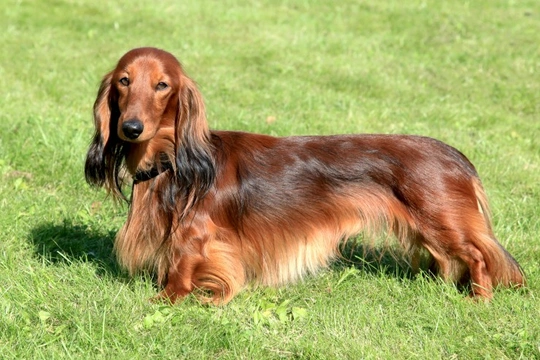
Spinal problems in the Dachshund dog breed
The Dachshund dog breed – also known by many as the sausage dog – is a very distinctive and instantly recognisable dog, thanks to their short legs and long bodies, which occur because of a form of canine achondroplasia, or dwarfism. However, this trait doesn’t keep the Dachshund from living a full, active life and having lots of fun – although it does increase the risk of dogs of the breed suffering from a range of spinal problems that can occur or be worsened as a result of their conformation.
The short legs of the breed and their proportionally very long backs mean that dogs of the breed are more vulnerable than most to both problems with the back and spine that result from their natural shape and build, as well as injuries or damage to the spine from impacts and injuries too.
Dachshund paralysis is one condition that is particularly likely to affect dogs of the breed – and in this article, we will look at the causes and symptoms of a range of other common spinal and back problems that can affect Dachshunds as well. Read on to learn more.
Dachshund paralysis
Dachshund paralysis can occur due to a combination of risk factors, such as conformation problems and injuries to the spine. Ultimately, if the condition causes a loss of function of the dog’s hind limbs, up to and including paralysis, the dog won’t be able to walk and get around normally, and may not be able to toilet properly too. This is irreversible, and may result in the need for a hind limb doggy wheelchair to enable your dog to exercise and move around.
Intervertebral disc disease
Intervertebral disc disease causes damage to the nerves that serve the spine, which leads to both pain and an inability to perform a full range of normal movements. The condition causes the discs that provide cushioning for the vertebrae of the spine to either swell and bulge, or break down, leading to compression of the spinal nerves and associated pain.
The dog may have a particularly painful area of their spine that is very sensitive to being jarred or touched, which may cause them to cry, snap or yelp if you try to touch the area in question, or pick your dog up.
They are also likely to display a hunched, uncomfortable-looking stance, and be unable to jump or climb normally, as well as displaying a shortened gait and having taut, tense muscles.
All of these things can cause your dog to refuse exercise and even food, and may lead to a loss of bladder and bowel control too.
Discospondylitis
Discospondylitis is the term used to refer to an infection in the discs or vertebrae of the dog’s spine, which can occur due to the spread of an infection from another area of the body, injuries to the back, or a foreign body becoming lodged in or near the spine.
The condition is usually painful but won’t normally affect the dog’s normal range of movement, but left unchecked, will later cause loss of coordination, higher levels of pain, and an inability to walk normally as the infection spreads and worsens.
Subluxation of the spine
Subluxation refers to a misalignment of the position of the dog’s spine, which can cause them to have an unusual posture or conformation and that may lead to the dog appearing to have a marked dip or shallow in the line along their spine from their head to their tail.
Dogs affected by subluxation will usually avoid being picked up, and will evade commands to sit, jump, or climb, as this will cause pain.
The dog in question may have stiff muscles in the spine and limbs too, or suffer from muscle wastage due to lack of use in order to avoid further pain. Subluxation can be caused in the Dachshund by a range of different things, including external injuries, falls or knocks.
Dachshunds are particularly vulnerable to subluxation due to the length of their spine and associated lack of support in the middle of it, which makes the spine more at risk of twisting, weakening and becoming damaged. Even using a badly fitting harness can cause the problem in some dogs, and dogs that pull on the lead or that are pulled back sharply are at particular risk of such damage.
Fractures of the spine
The long, low back of the Dachshund and again, the lack of support given its length puts the Dachshund at a higher than normal risk of fracturing their spines, as a result of a fall, impact or injury. A very minor and mild fracture may not cause any problems or symptoms for your dog and may even heal on its own without you realising there was a problem – but spinal fractures can also be very acute and painful in some cases too.
A minor fracture might cause the dog to suffer from mild pain, aches or soreness, or a degree of muscle weakness, whilst a more serious fracture can potentially cause paralysis from the point of the fracture backwards, due to associated damage to the spinal nerves.
This paralysis cannot usually be reversed, and may also cause a loss of bladder and bowel control too.



